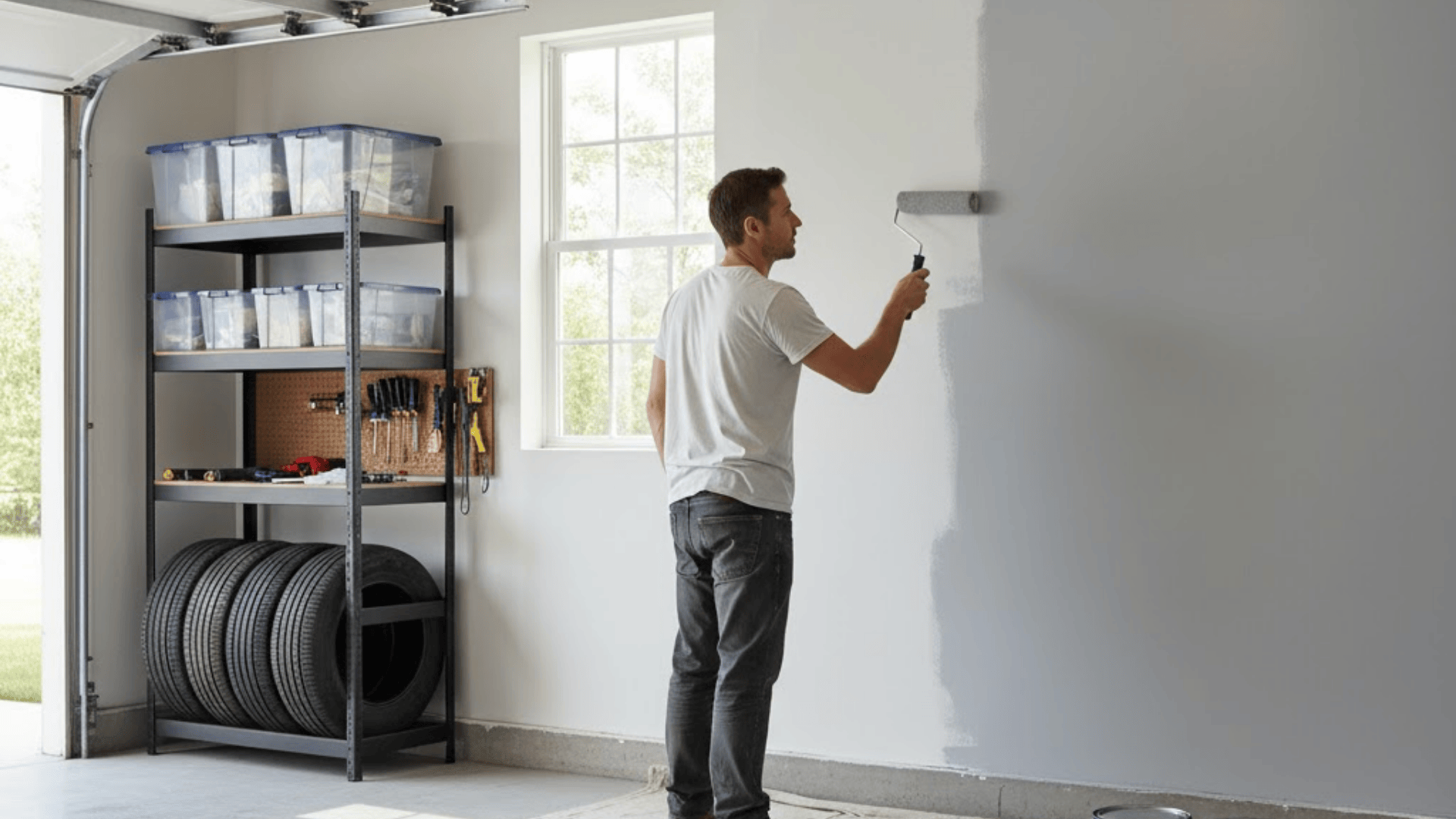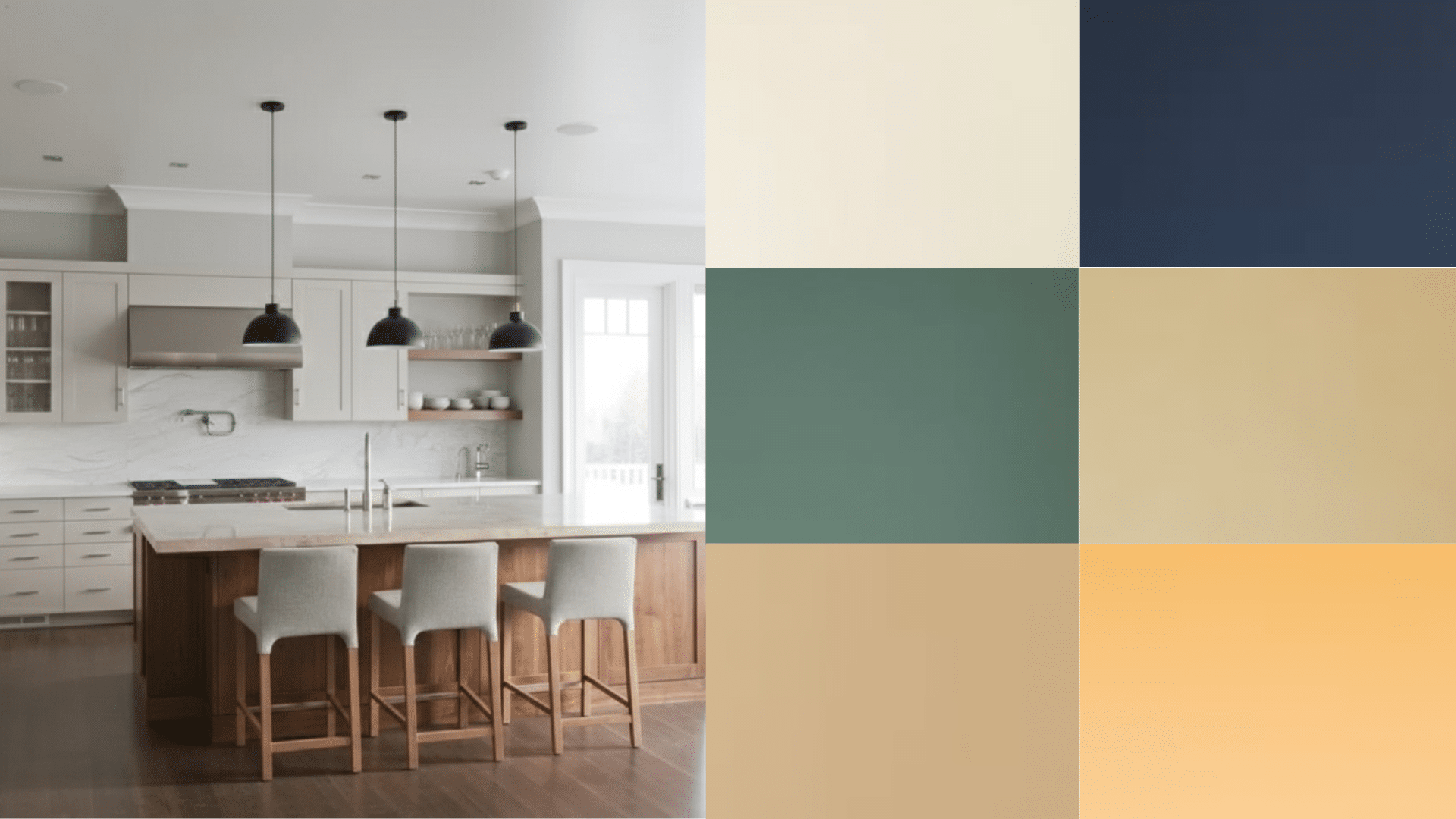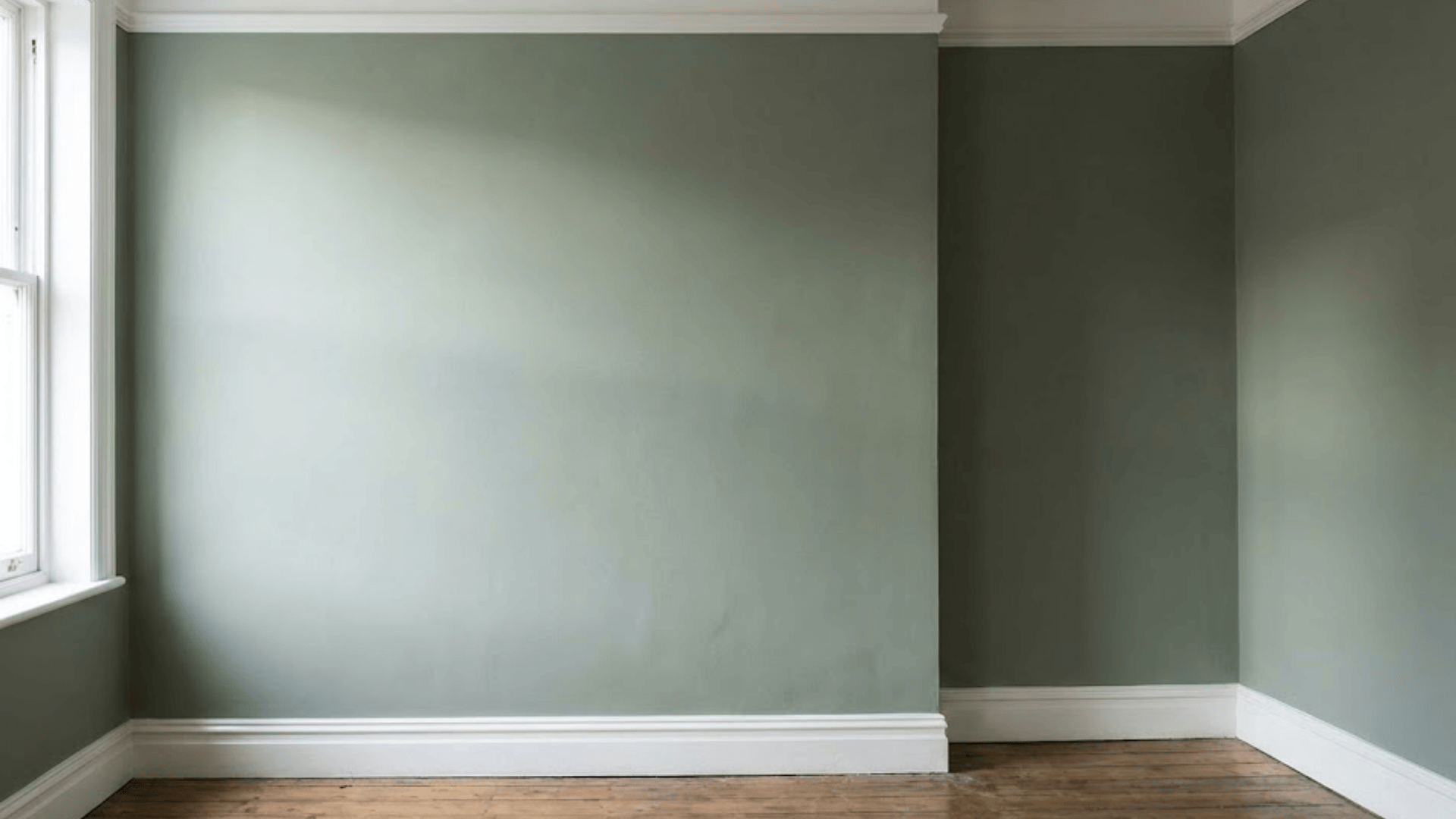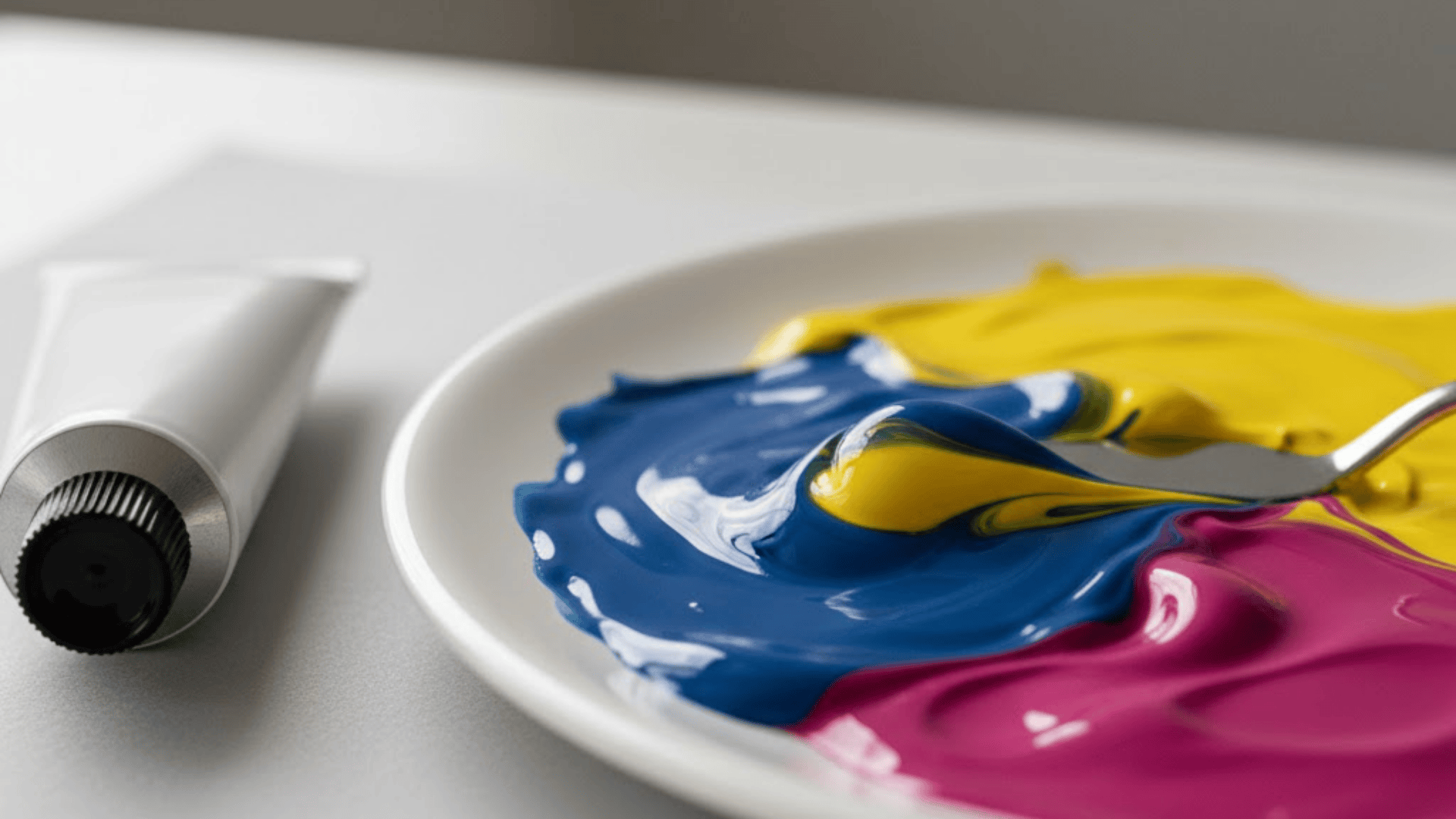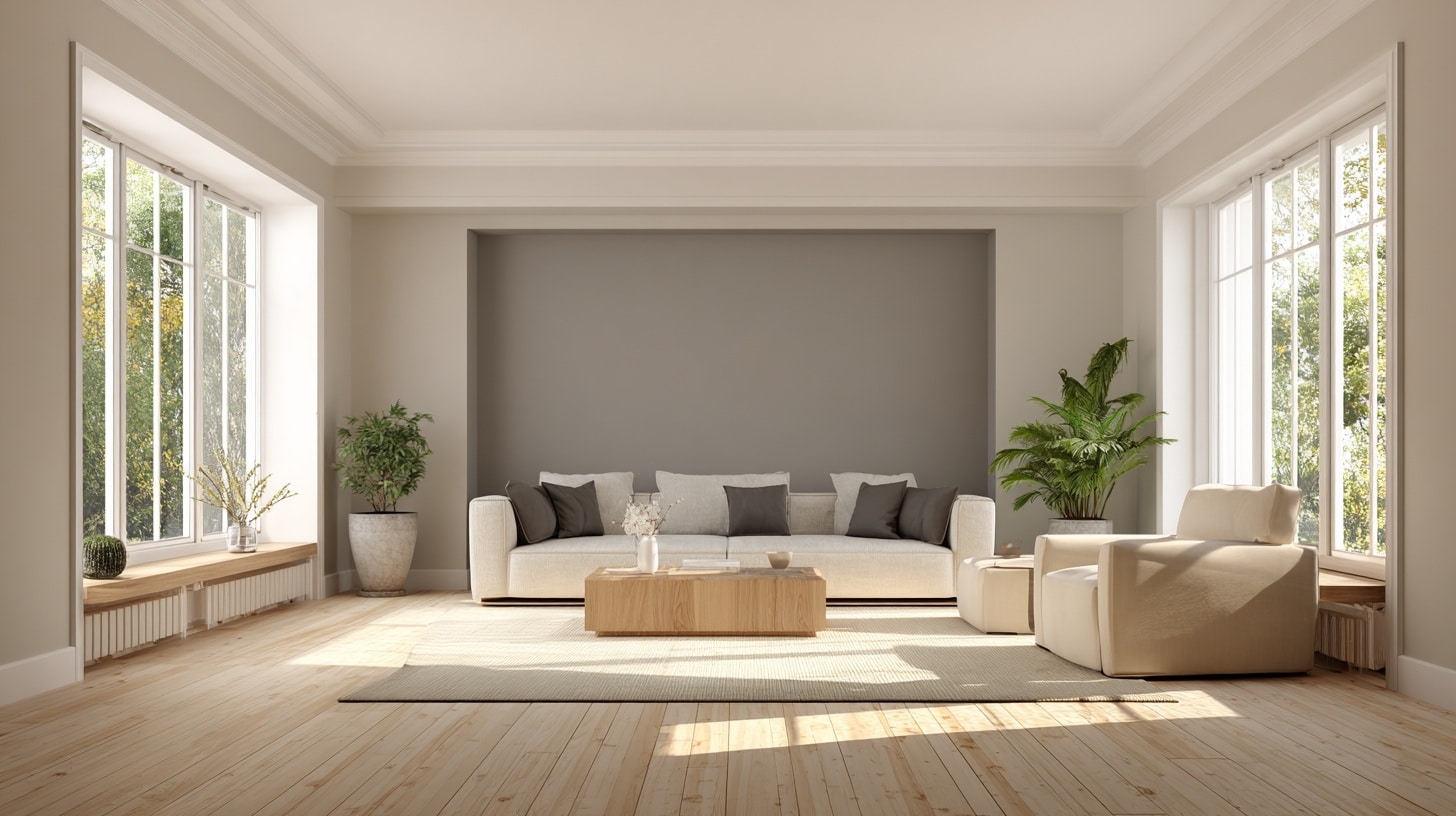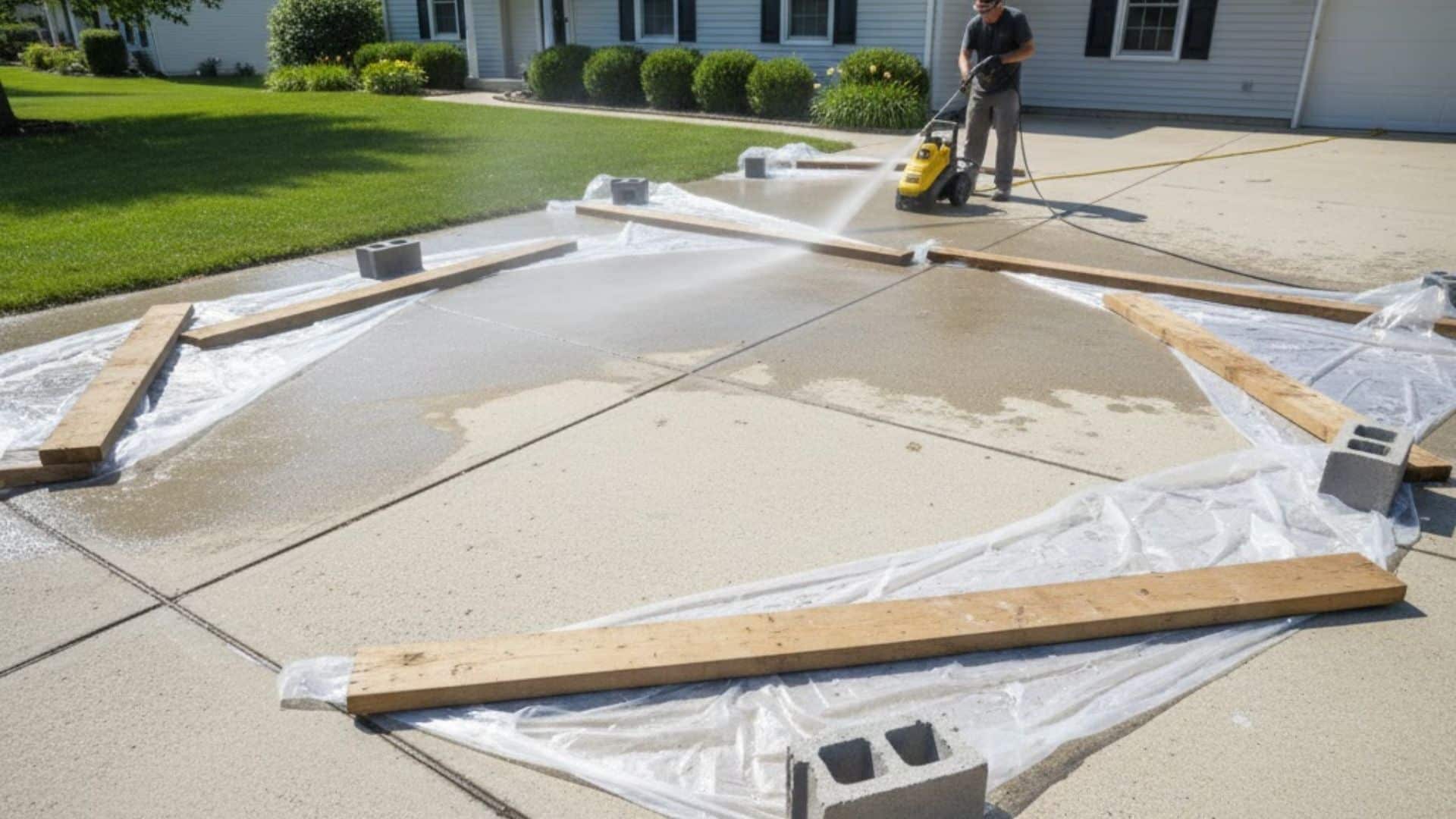Are you tired of watching your garage walls crack, peel, and fade just months after painting them with regular interior paint? Finding the best paint for garage walls feels confusing when you’re faced with countless options in the hardware store aisle.
I want to help you choose paint that actually survives temperature swings, moisture, dust, and daily wear without constant touch-ups. Your garage deserves protection that lasts, rather than paint that disappoints you year after year with premature failure.
The right choice saves you time, money, and the frustration of redoing the same job repeatedly over the years. Let me show you the best paint for garage walls so you can finally get lasting results.
Why Your Garage Walls Need Special Paint
Your garage faces harsher conditions than any room inside your house, so it needs paint that can handle the challenge.
Temperature swings happen constantly as you open and close the door, exposing walls to hot summers and freezing winters.
Dust from cars, tools, and outdoor debris settles on garage walls much more than it does in your living room. Moisture seeps in from rain, snow, humidity, and even your car, bringing wetness inside after driving through bad weather.
Interior paint wasn’t designed for these tough conditions, so it cracks, peels, and fades quickly when you use it.
Garage-specific paint contains special ingredients that resist temperature changes, repel moisture, and stand up to daily wear and tear.
Best Paint Types for Garage Walls
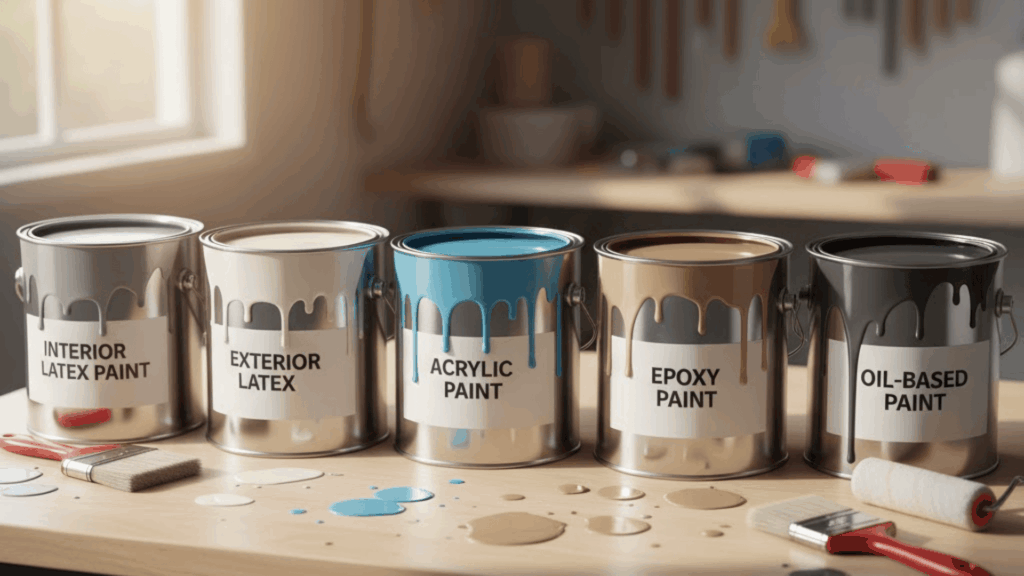
Each paint type offers unique benefits depending on your garage setup, climate conditions, and how you use the space daily. Here are the best options with their specific features, advantages, and drawbacks:
1. Interior Latex Paint
Interior latex paint dries quickly, usually within one to two hours, and produces minimal odor during application and drying. It cleans easily with soap and water, making maintenance simple when dirt or grease accumulates on your walls.
This water-based formula works perfectly on finished drywall and provides good coverage with just two coats. However, it doesn’t handle extreme temperatures or high moisture well.
2. Exterior Latex Paint
Exterior latex paint resists moisture penetration and handles temperature fluctuations from freezing winters to hot summers without cracking or peeling.
It contains mildew-resistant additives that prevent mold growth in damp garages where humidity levels stay high throughout the year. This paint bonds well to concrete, wood, and drywall surfaces effectively. The downside is slightly longer drying times and a higher cost.
3. Acrylic Paint
Acrylic paint stays flexible after drying, allowing it to expand and contract with temperature changes without cracking on your walls. It resists fading from direct sunlight exposure, making it perfect for garages with windows or doors that let in bright light.
This paint maintains color vibrancy for years, even in high-UV environments indoors, and adheres well to most surfaces. The main drawback is the higher cost.
4. Epoxy Paint
Epoxy paint effectively creates a waterproof barrier that protects concrete and masonry walls from moisture damage, oil spills, and chemical exposure. It bonds exceptionally well to porous surfaces like cinder blocks and bare concrete, creating a hard, durable finish that lasts.
This paint resists stains, impacts, and abrasions better than any other option available today. However, epoxy requires careful surface preparation and has strong fumes.
5. Oil-Based Paint
Oil-based paint delivers exceptional durability and creates an extremely hard finish that effectively withstands heavy wear in high-traffic garage areas. It provides superior adhesion to previously painted surfaces and covers stains better than water-based alternatives, requiring fewer coats.
This paint resists moisture and temperature changes well, maintaining its protective qualities for many years without significant deterioration. The major downsides include strong odors and high VOC content.
Best Finishes for Garage Walls
The paint finish you choose affects how easily you can clean your walls, how well they resist moisture, and how they look overall. Here are the most common finishes and which ones work best for different garage situations:
- Semi-Gloss: This shiny finish offers the best cleanability and moisture resistance, making it perfect for garages with heavy use and frequent spills.
- Satin: A balanced option that’s not too shiny but still easy to maintain, satin works well for most standard garages with moderate activity.
- Eggshell: This subtle finish suits low-traffic garages where you store seasonal items but don’t work on projects or park dirty vehicles regularly.
- Flat: While flat paint hides wall imperfections beautifully, it’s not recommended for heavy use because it absorbs stains and resists cleaning poorly.
Shinier finishes like semi-gloss handle scrubbing and moisture better, but show every wall imperfection more clearly than flatter options. Choose based on how much cleaning your garage walls will need and how often you use the space daily.
Top Paint Brands for Garage Walls
Here are some of the top paint brands trusted for garage walls based on durability, moisture resistance, and overall performance. These options range from budget-friendly to premium choices, depending on your needs and budget:
| Brand | Paint Type | Ideal For | Average Cost (USD/gallon) | Ratings |
|---|---|---|---|---|
| Sherwin-Williams | Acrylic Latex (Duration, SuperPaint) | Durable garage walls with moisture resistance | $50 – $70 | ★★★★★ 4.7 |
| Behr | Acrylic Latex (Premium Plus, Marquee) | High-traffic garage walls, stain resistance | $40 – $60 | ★★★★☆ 4.6 |
| Benjamin Moore | Acrylic Latex (Regal Select, Aura) | Long-lasting, mildew-resistant garage walls | $60 – $80 | ★★★★★ 4.8 |
| Rust-Oleum | Mold & Mildew-Proof Latex Paint | Humid, mold-prone garage environments | $25 – $45 | ★★★★☆ 4.5 |
| Valspar | Acrylic Latex (Signature Interior) | Budget-friendly garage paint with durability | $30 – $50 | ★★★★☆ 4.3 |
Each brand offers specific advantages like antimicrobial protection, one-coat coverage, or excellent freeze-thaw resistance for challenging garage conditions. Choose based on your climate, budget, and how much durability you need for your specific garage use and activity level.
Step-by-Step Guide to Painting Garage Walls
Painting your garage walls correctly ensures a professional finish that lasts for years without peeling, cracking, or fading prematurely. Follow these six simple steps to transform your garage walls from start to finish:
- Step 1: Gather Your Supplies: Collect all necessary materials, including rollers, brushes, drop cloths, painter’s tape, primer, and your chosen paint, before starting the project.
- Step 2: Protect Your Space: Cover the floor with drop cloths and tape off trim, outlets, and edges to keep paint only where you want it.
- Step 3: Prepare the Walls: Clean walls thoroughly to remove dust, grease, and dirt, then patch any holes or cracks with spackling compound and sand smooth.
- Step 4: Apply Primer: Roll on a quality primer designed for garage walls and let it dry completely before moving to the next step.
- Step 5: Paint Two Coats: Apply your first coat of paint evenly, allow proper drying time, then add a second coat for complete coverage and durability.
- Step 6: Add Finishing Touches: Once the main wall coats are completely dry to the touch, paint trim or add accent finishes if desired.
Taking your time with each step ensures better results than rushing through the entire project in one weekend. Proper preparation and patience make the difference between paint that lasts years versus paint that fails within months of application.
Best Paint Colors for Garage Walls
Choosing the right color can completely change how your garage feels and functions. Lighter tones create space and reflect light, while deeper shades add calm and depth. Here are a few trusted colors that balance practicality and style for every type of garage:
1. Light Gray
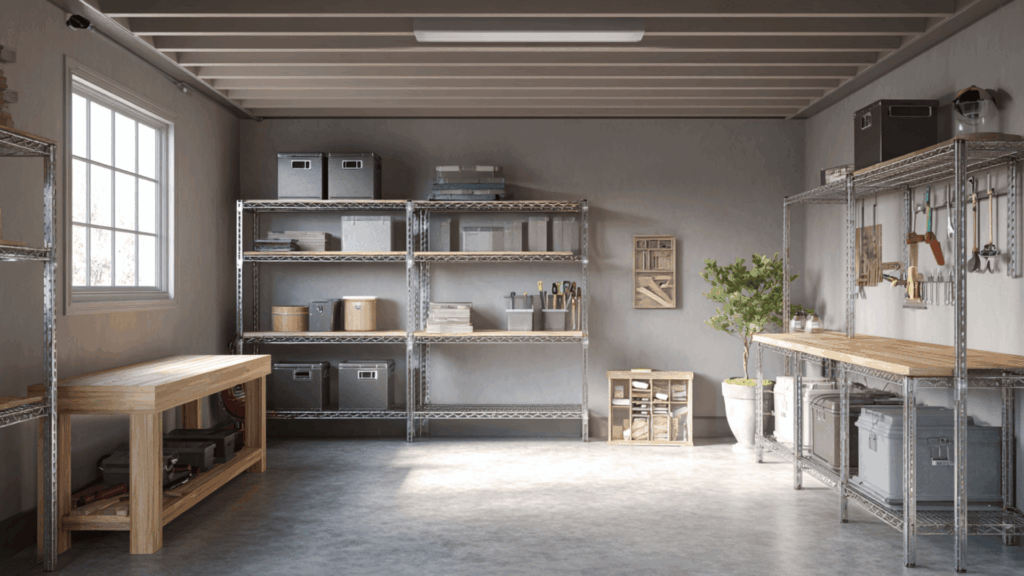
Light gray makes the garage feel open and organized without looking sterile. I’ve seen it used in several workshops where it hides dust well.
Experts say it’s perfect for balancing brightness and warmth in functional spaces. It gives the room a clean, practical, and modern look that feels calm and uncluttered.
2. Bright White
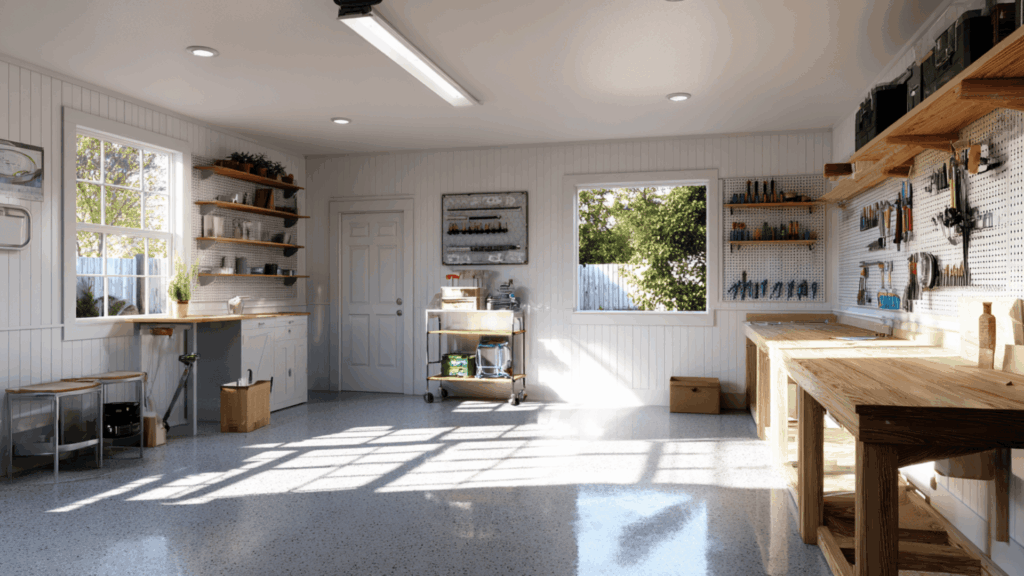
Bright white instantly brightens darker garages and reflects light beautifully. My friend Jake, who uses his garage as a home workshop, told me, “White paint made my space look cleaner and easier to work in.”
Professionals recommend semi-gloss white because it’s easy to clean and improves brightness, giving a crisp, well-maintained appearance overall.
3. Warm Beige
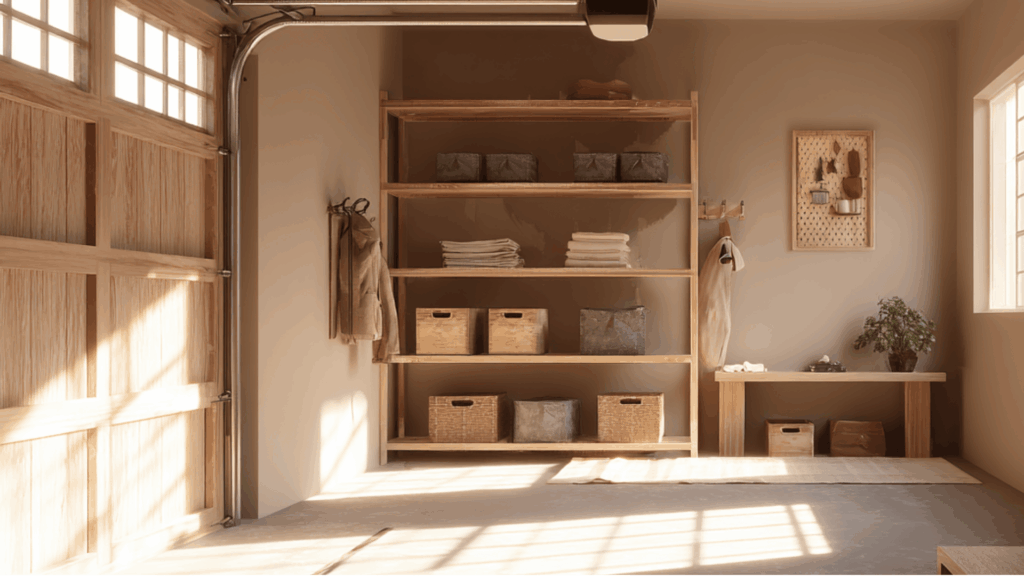
Warm beige adds comfort and subtle warmth without making the garage look too soft. I recommend it if you use your garage as a multi-purpose space.
It pairs well with wood shelving, neutral floors, and natural light. The result feels inviting and practical, making your garage an extension of your living area.
4. Slate Blue
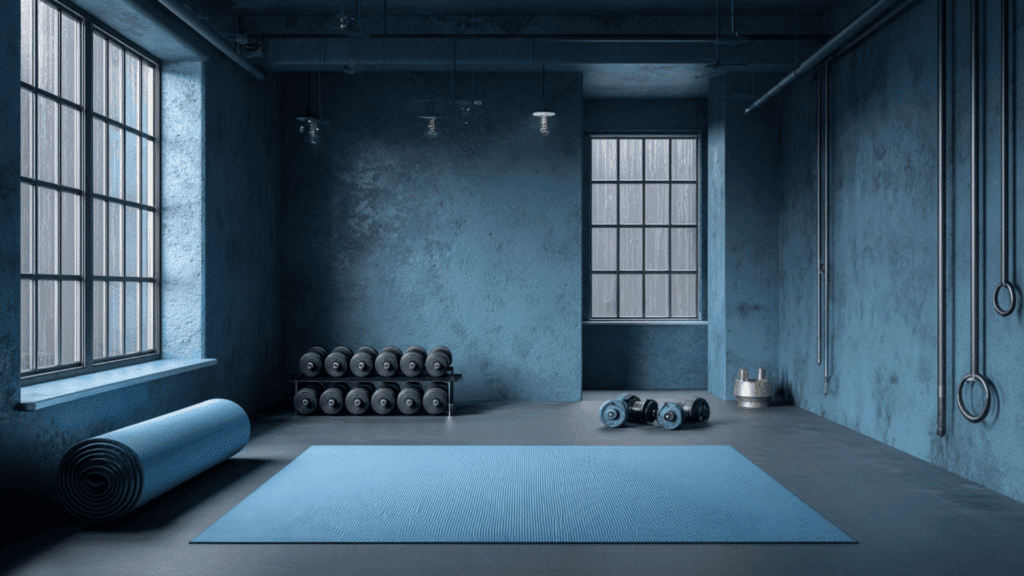
Slate blue brings a cool, industrial look that still feels calm and refined. My colleague Anna, who recently remodeled her garage gym, said, “Slate blue makes it feel modern without feeling cold.”
Specialists agree it hides scuffs and marks better than lighter colors. It adds quiet depth while keeping your space fresh and balanced.
Community and Expert Recommendations
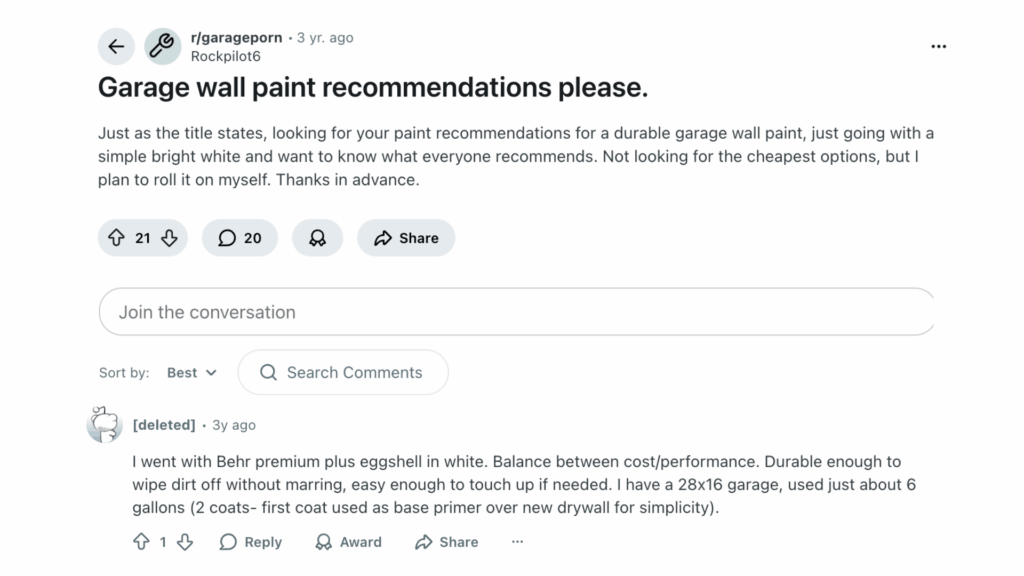
Many real homeowners prefer brands like Sherwin-Williams and Behr for garage walls because they are tough and easy to clean. Contractors often suggest satin or semi-gloss finishes for durability and wipeability.
A popular Reddit conversation shows people recommending Behr Premium Plus eggshell as a good balance of cost and performance.
Another user mentioned Sherwin-Williams Duration paint as almost bulletproof and easy to wipe down. Real experiences show that a good primer and two coats of paint give the best results.
Final Words
Now you know exactly which options work best as the paint for garage walls based on your climate and usage needs. I hope these practical recommendations help you avoid costly mistakes and achieve a finish that truly lasts for years.
Remember that proper surface preparation and choosing the right finish make just as much difference as the paint itself. Your garage can look clean, organized, and professional when you use products designed specifically for these demanding conditions daily.
Start by evaluating if your garage stays heated, how much moisture it gets, and what activities happen inside regularly.
What’s your biggest challenge when it comes to keeping your garage walls looking good? Share your garage painting experiences in the comments below.

